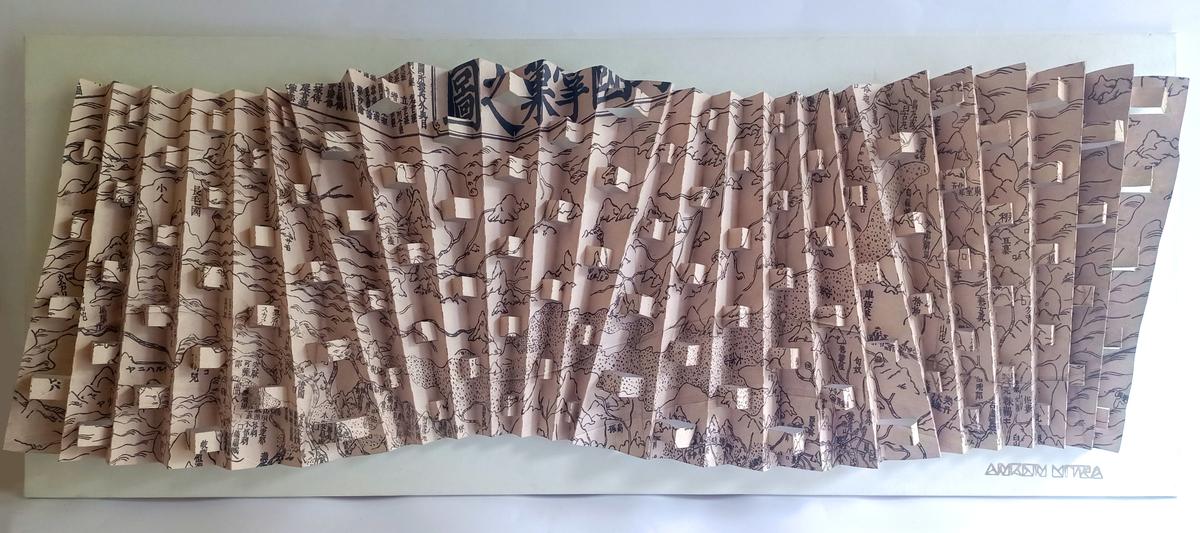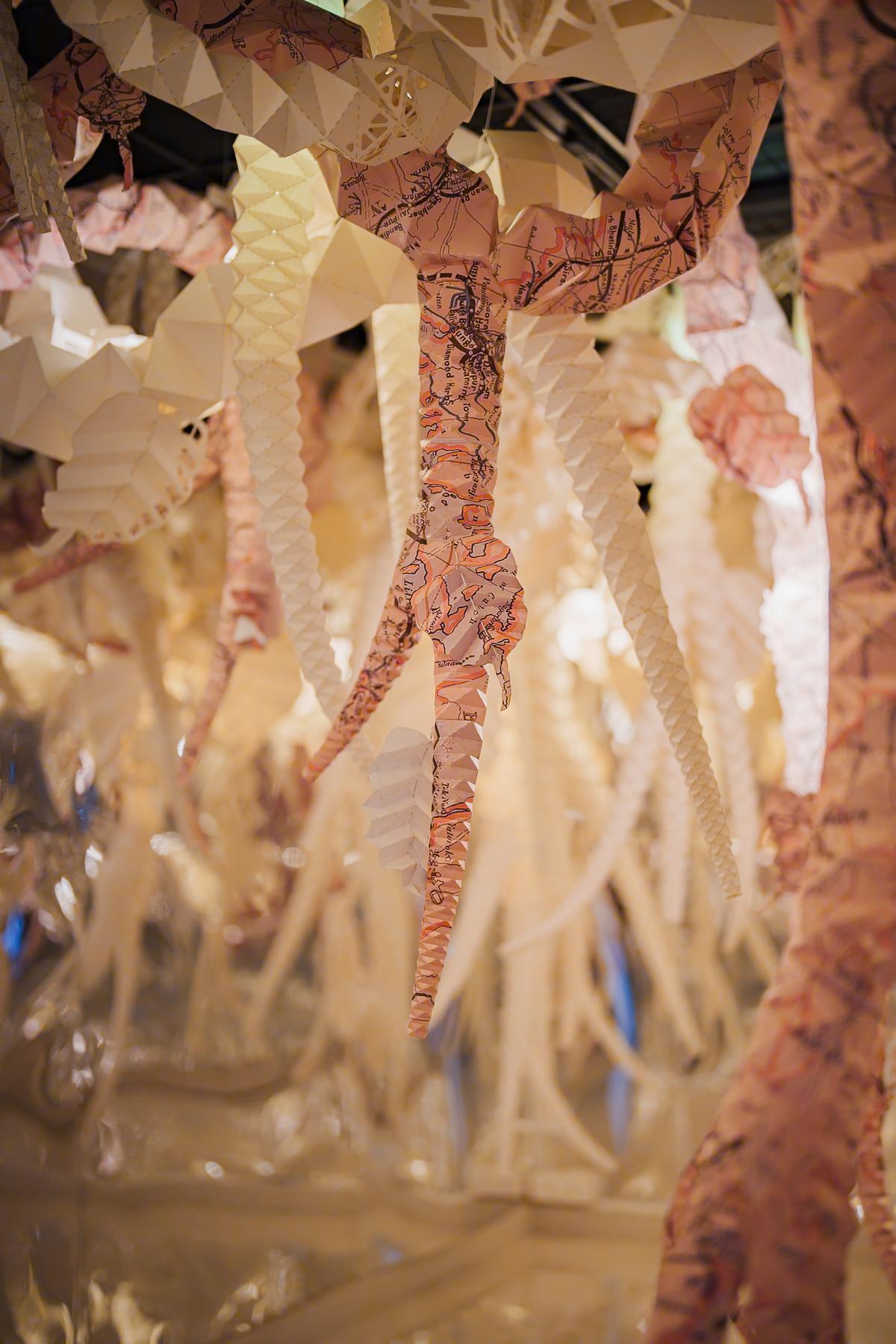[ad_1]
A series of deep blue circular structures greet visitors at the entrance of Kalakriti Art Gallery in Banjara Hills, Hyderabad. The installation is part of Map Unfolded, a showcase of artworks by architect, sculptor and origami artist Ankon Mitra, curated by gallery owner, Prshant Lahoti. The installation features illustrated maps of the constellations in the Milky Way galaxy. Viewed from the other end, it reveals the many moons of the solar system. A few feet away, illuminated lampshades bear printed images of old maps of Hyderabad, Kolkata, Goa, Mumbai and Chennai.
When Prshant, who has an enviable repository of maps, proposed the idea of artworks inspired by maps, Ankon was game. He explains, “An artist might create something on a blank canvas whereas an architect like me responds to a brief — say, a 1000-bed hospital, a residential complex or an educational institution — and creates something artistic and functional. Through this collaboration with Prshant and Rekha Lahoti, I wanted to see if we could design artworks that spark wider interest, not limited to map nerds.”
Between the folds
Ankon wanted visitors to pause, observe the oritecture (origami and architecture) artworks and discover new details. “I then thought of three-dimensional artworks that reveal a few details and conceal a few within the origami of origami, that pique the viewers’ curiosity.”

Ankon Mitra, lampshade with printed map, globe with origami maps
| Photo Credit:
Special Arrangement
Having browsed the maps at Kalakriti Archives, the artist worked out a road map (pardon the pun) to make three-dimensional art inspired by the two-dimensional maps. “I found maps of Europe dating back to the 12th and 13th centuries and maps of India from the 17th century to the present and shortlisted what could work for this show. Prshant has a series of city maps, pilgrimage maps, bazaar maps, and so on.”
Ankon explains how a map of Madurai shows the Meenakshi Sundareshwarar temple and its vicinity, with flower sellers and copper vessel sellers, thus mapping the bazaar. Another map of Benares shows the bazaars near the Kashi Vishwanath temple. A pilgrimage map of Uttarakhand highlights prominent religious sites including Kedarnath, Badrinath and Amarnath.
A few maps of Indian pilgrimage sites are reimagined through the Japanese art of Ikebana. In his research, Ankon found parallels between the art and culture of India and Japan. “There is a spiritual significance to the method of Ikebana arrangements and the placement of the vase. We tried to reinterpret old pilgrimage maps in that form.” Maps of Thiruchendur, Uttarakhand, Dwaraka and Benares are printed and folded in a specific manner to form the ikebana-inspired artworks.

This is Ankon’s first full-fledged showcase of artworks in Hyderabad, which also features pinwheel-inspired installations and ori-kiri (a combination of origami and kirigami) installations with printed maps.
Old and new
“We also created lenticular maps,” says the artist. The idea borrows from the distortion of images when viewed through a double convex lens. Ankon reimagines the concept inspired by the childhood plastic toys that reveal two images when we turn a card left to right in our hands. The origami folds of the paper have been worked upon such that a lenticular map of Jaipur reveals a Unesco World Heritage-tagged map of the walled city (2019) when viewed from one side. From another direction, the same map shows an archival Navagraha map of Jaipur city (1885). The installation works as a sculptural time travel.

A lenticular map installation by Ankon Mitra
| Photo Credit:
Special Arrangement
Map Unfolded features nearly 100 artworks, a few inspired by everyday objects. A pinwheel is reimagined as the earth spinning on an imaginary axis. Spin the artwork and maps of the north and the south poles come into view. Did anyone say maps are boring? An ori-kiri artwork, within its cuts and folds, reveals a map of the Himalayas, Tibet and Kashmir.
Apart from maps sourced from Kalakriti Archives, a few abstract installations are inspired by ‘cloud maps’ made public by the European Space Agency (ESA), National Aeronautics and Space Administration, USA (NASA), Indian Space Research Organisation (ISRO), Japan Aerospace Exploration Agency (JAXA) and their geosynchronous satellites, with video footage from the International Space Agency (ISS).
International attention
Ankon Mitra’s work has been exhibited internationally, including the CODA Museum in Apeldoorn, the Netherlands and Arte Laguna, Arsenale de Nord, Venice (2021), India Pavilion of the London Design Biennale at the Somerset House (2022) and the Shanghai Paper Art Biennale (2023).
Selfie mirror room
“The idea of including maps of clouds and galaxies was to complete the circle, apart from having maps of cities and countries,” says Prshant. He views this exhibition, with its 3D sculptures, murals and installations, as varied expressions of form, space and light.

Mirror room
| Photo Credit:
Special Arrangement
A mirror room where visitors can take selfies, while archival maps and images of the Charminar and Red Fort come into view, further amplify the interactive quotient of the exhibition. Elsewhere, a globe is also reimagined as a series of origami sculptures.
“A display of archival maps and photographs is something museums have been doing for decades,” says cartophile Prshant. “I wanted to marry archival material with contemporary art to make it more interesting.” Origami-inspired art with printed maps, he says, can be viewed as an extension of how older maps are folded and preserved. “Each time I open an old map, I find it tough to fold it back the same way. There are overlaps, which also add to the artistic quality.”
Maps Unfolded might just be the beginning. Kalakriti and Ankon are working on a new collaborative showcase for India Art Fair 2025.
(Maps Unfolded is on view at Kalakriti Art Gallery till October 5)
Published – September 17, 2024 05:25 pm IST
[ad_2]
Source link





